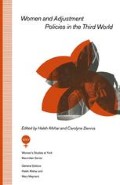Abstract
If the purpose of research is to reveal, the purpose of advocacy is to see the revelation into wider consciousness and then into policy and remedial actions. This chapter is concerned not with an analysis of the impact of structural adjustment on women, but of the process of making that impact known, and postulating damage limitation and even preventative measures, as well as proposing alternatives to current forms of adjustment. It is a somewhat personal history, since it is the nature of political advocacy — about unusual and innovative issues — to travel light, so to speak, forming coalitions and caucuses as the opportunity arises.
Access this chapter
Tax calculation will be finalised at checkout
Purchases are for personal use only
Preview
Unable to display preview. Download preview PDF.
Notes and References
Grace Akello, ‘Self Twice Removed: Ugandan Woman’, CHANGE, 1983;
Tsehai Berhane Selassie, ‘In Search of Ethiopian Women’, CHANGE, 1984;
Naila Kabeer, ‘Minus Lives: Women of Bangladesh’, CHANGE, 1983.
See Georgina Ashworth and Lucy Bonnerjea, The Invisible Decade: UK Women and the UN Decade (Gower, 1985);
also Georgina Ashworth, ‘The International Women’s Movement and the UN Women’s Conference’, in Pressure Groups in the Global System, ed. Peter Willetts (New York: Frances Pinter Publishers and St Martin’s Press, 1981).
Georgina Ashworth, ‘Women and the North-South Campaign’, unpublished paper for European North-South Campaign, Strasbourg, 1988.
UN NGLS/Oxfam, ‘Debt, Adjustment and the Needs of the Poor: Final Statement’, September 1987 and Full Report 1988.
Andrea Cornia, Richard Jolly and Frances Stewart (eds), Adjustment with a Human Face (OUP for UNICEF, 1988).
J. Clark, and C. Allison, Zambia: Debt as Poverty (Oxfam, 1989).
Noeleen Heyser, ‘The Impact of Food-Energy-Foreign Debt Management on Women: Concepts and Issues’, for Southeast Asia DAWN Network, 1987.
Georgina Ashworth (ed.), Bridging the Gap: Issues for Women’s Studies and Development studies for the 1990s, for Krishna Patel, INSTRAW, 1989. See also Marjorie Williams, ‘The Global Economic Crisis, Structural Adjustment and the Fate of Women’, a concept paper for the Women’s Alternative Economic Summit, July 1988; ‘Statement and Recommendations’ from Women and the Debt Crisis Working Group, The Hague, March 1988.
United Nations, Report: ‘UN Interregional Seminar on Women and the Economic Crisis: Impact, Policies and Prospects’, CSDHA, Vienna, October 1988.
Editor information
Editors and Affiliations
Copyright information
© 1992 Haleh Afshar and Carolyne Dennis
About this chapter
Cite this chapter
Ashworth, G. (1992). Politicising Gender and Structural Adjustment. In: Afshar, H., Dennis, C. (eds) Women and Adjustment Policies in the Third World. Women’s Studies at York/Macmillan Series. Palgrave Macmillan, London. https://doi.org/10.1007/978-1-349-11961-5_10
Download citation
DOI: https://doi.org/10.1007/978-1-349-11961-5_10
Publisher Name: Palgrave Macmillan, London
Print ISBN: 978-1-349-11963-9
Online ISBN: 978-1-349-11961-5
eBook Packages: Palgrave Social & Cultural Studies CollectionSocial Sciences (R0)

